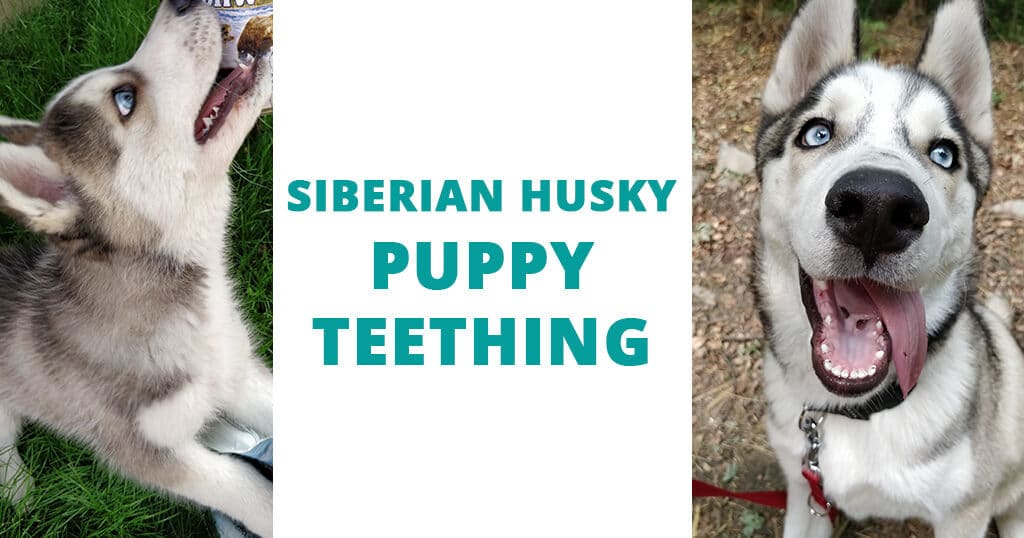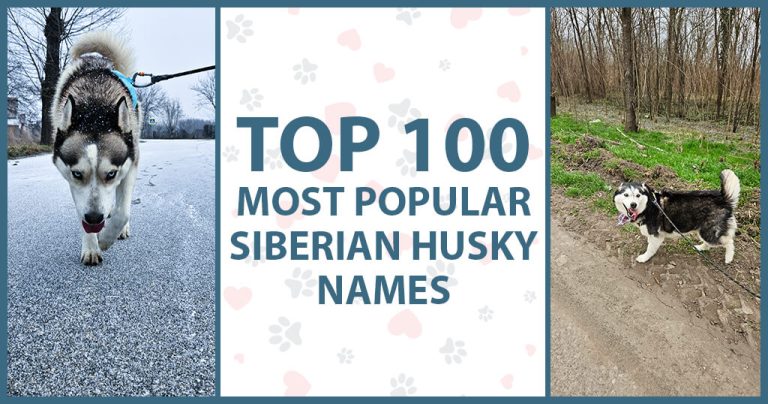A puppy is born toothless and he needs to go through two teething periods until he will have his strong and adult teeth. The Siberian Husky puppy teething period is a hard period for the owner but even harder for the puppy. If you just brought a sweet little husky puppy home, you might notice that he starts biting and chewing every object in the house. Your hands or legs are not exceptions either. Chewing is a necessary need for your Siberian husky puppy while he is teething.
My Siberian huskies chased me around the house and bit me when I took a seat at my desk. During morning coffee, I was their chewing toy at first. If this happens to you, then you should know that your Siberian husky puppy is teething. When he is biting on something, your puppy tries to relieve the pain. He also bites to discover the world or to make you play with him. We’ll talk about how you can make your puppy stop biting you in this article and chew on something that is more appropriate.
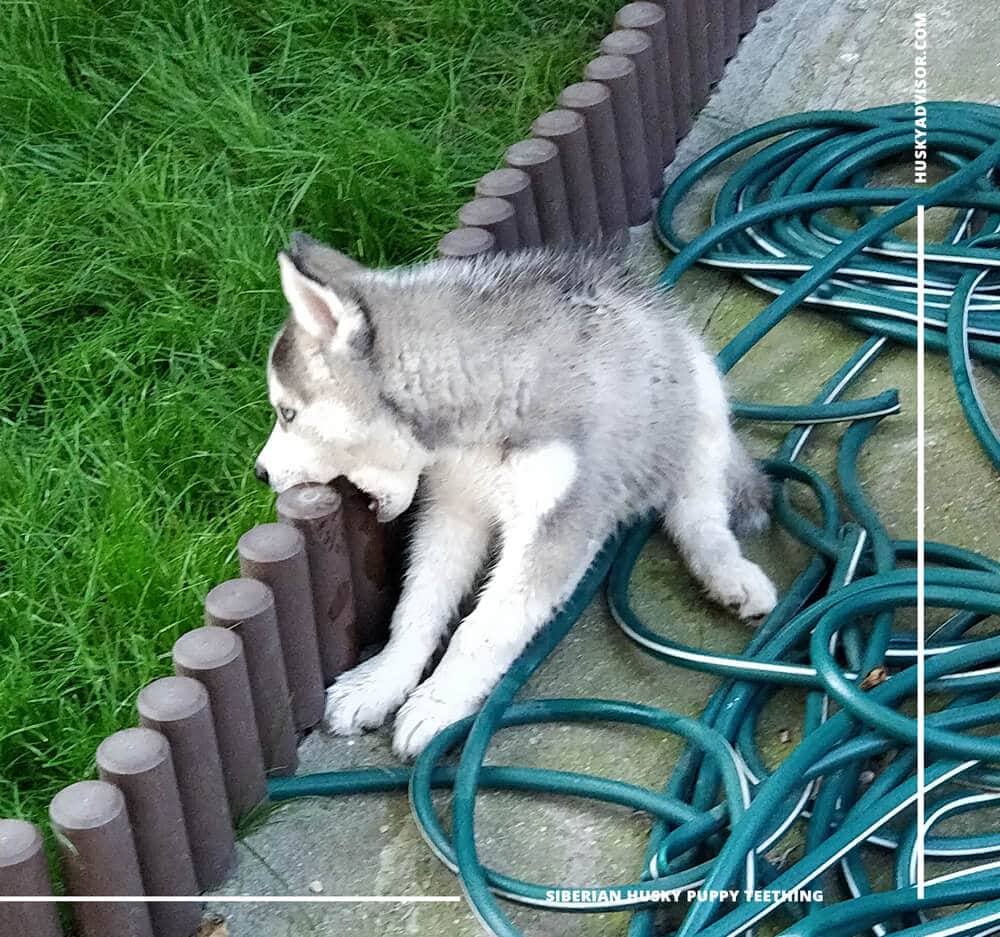
When will my Siberian husky puppy’s teething period stop?
Even if it’s just the beginning of teething, you are already thinking about when will it stop. The teething process may seem to you that lasts forever. You might worry about your puppy while he is teething and start asking yourself when your Siberian husky puppy will stop teething. You can relax now and take a deep breath. The teething process will stop when your puppy will be about 7 or 8 months old. But this doesn’t mean he will bite you or chew the furniture until then. There are ways to help your puppy with his teething pain and to stop him from biting you.
Do Siberian Huskies have baby teeth?
Yes, Siberian huskies have 28 baby teeth. Huskies, like all dogs, are born toothless. Their baby tooths will start to come when they will be about 3 weeks old. When a husky puppy has 8 weeks, he should have all of his baby teeth.
How many adult teeth Siberian huskies have?
Siberian huskies have 42 adult and permanent teeth. A Siberian husky will have all his adult teeth when he will be about 8 months old. At this age, you should take your husky puppy to a vet to see if there are any milk teeth left.
Do Siberian husky puppies feel pain when teething?
When your Siberian husky puppy is teething, he will feel pain and discomfort. That’s why he will start to chew everything. He tries to relieve some of the pain while he is chewing. Give him some chew toys so he can chew on something appropriate. The pain and discomfort will come and go during the teething period. Baby teeth grow, fall and then permanent teeth start to appear. It’s a hard period of time for your puppy, so be patient with him and get him to go through this.
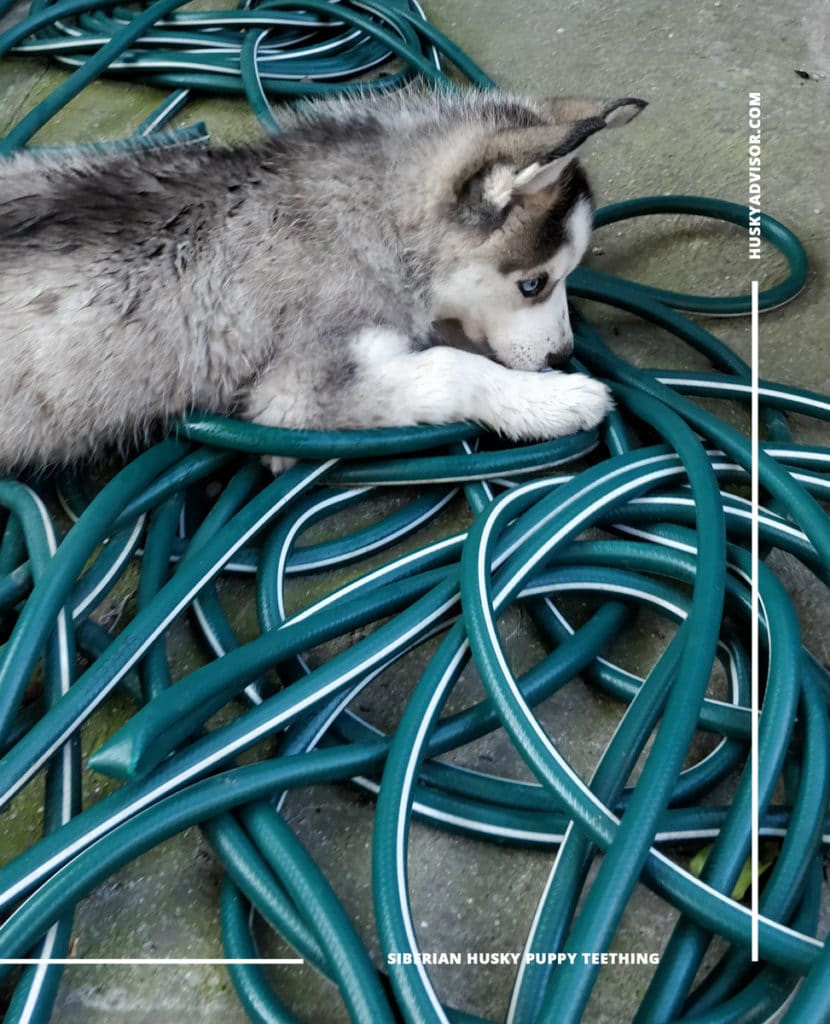
How can I help my Siberian husky puppy with teething pain?
You can help your Siberian husky puppy with teething pain by giving him chew toys that are made specifically to help him with puppy teething. Also, you can use frozen vegetables or fruits that can numb for a while your puppy’s mouth. Frozen fruits, ice cubes, or frozen vegetables that are safe for your puppy, can help release the pain. I used to give my dogs frozen carrots pieces and ice cubes to make them feel better. I still feed them plenty of fruits and vegetables such as carrots, apples, or even cucumbers during training sessions. Before you feed fruits or vegetables to your dog don’t forget to peel them and remove the core and the seeds.
What are the signs your Siberian husky puppy is teething?
Your Siberian husky will chew everything while he is teething
Your Siberian husky puppy will start to chew and bite when he is teething. Your puppy chews a lot because he wants to relive the discomfort that he is experiencing during the teething period. Start introducing safe chewing toys to your husky puppy and encourage him to chew toys. Give him toys when he wants to bite you or your furniture or anything else he shouldn’t bite – basically always have a toy nearby so you can be prepared.
You have to train him to chew toys for his safety and for yours. By training him you will keep your house intact during your husky puppy destroying phase. A husky puppy can bite and chew everything and this can put him in danger. For example, if your puppy starts to chew your sofa and bite through the fabric until he gets to the sponge. He can easily choke with a piece of sponge or fabric. Or if your puppy starts to chew wood, some splinters can get stuck in your puppy’s gums. You don’t want that, so keep your eyes on your puppy. And of course, if you don’t discourage this behavior it can be harder to teach him what is wrong and what is right to chew once he is a big boy (or gal).
How can I get my Siberian husky puppy to stop biting and chewing?
You need to keep a close look on your Siberian husky puppy. When he is going to bite or chew something that he is not supposed to, tell him that what’s he is doing is wrong. Choose a command that will capture your puppy’s attention. A sharp “AH AH!” will get his attention. Or another signal for “No”, such as “Leave”. Just choose another word different than “No”. You don’t want to yell or constantly say “No” to your puppy. That’s why is better to choose a signal for “No”.
After you inform your dog that what he’s biting was not ok, replace what he was biting or chewing with a safe chew toy. Praise him once he starts biting the toy so he will know that you are approving his action. If you keep reinforcing and rewarding good behavior, your dog will stop destroying things from your house and start chewing only on his toys. Don’t forget to reward and praise him when he starts to chew the toys all by himself. He needs some guidelines and he needs to be trained. Your puppy wants your approval and he will do anything to hear you praise him with a “Good boy!”.
Don’t discourage chewing. A Siberian husky puppy needs to chew. He just needs some guidelines on what to chew and what not to chew. Chewing is essential for your puppy and you need to encourage this behavior. It’s a normal and healthy thing for him to do, just not on you or on valuable objects.
Your Siberian husky puppy can droll and leave blood spots on what he chewed
When husky puppies are teething is normal for them to droll and bleed a bit. Teeth are growing, falling, and growing again. It is normal for his gums to bleed a little bit.
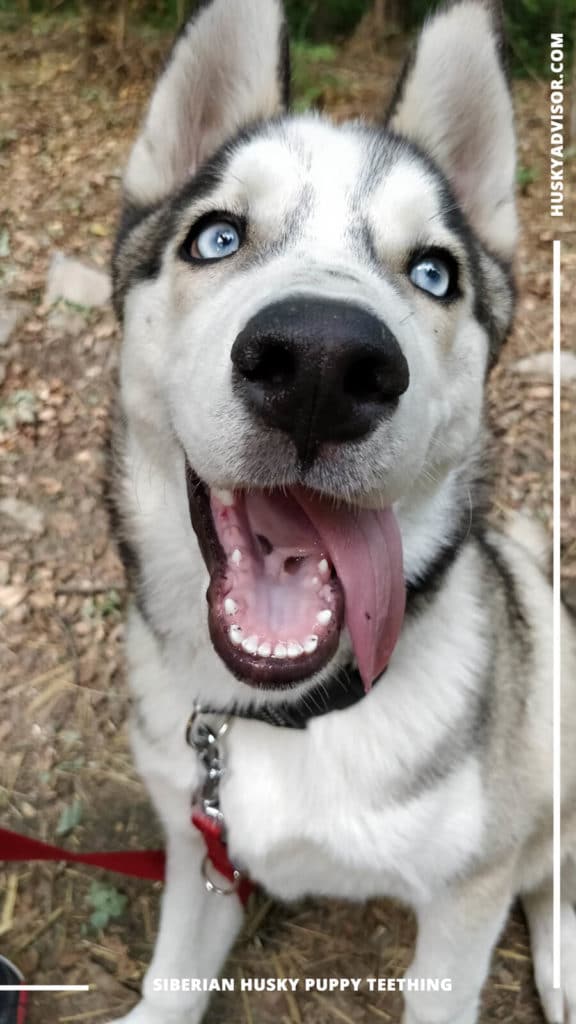
Your husky puppy might not want to eat so much while he is teething
Your Siberian puppy’s gums are very sensitive during the teething period and that’s why he might not want to eat so much. Because he is just a puppy you can’t switch his food too often. Changing his foods, a lot at this early age can cause intestinal upset.
Feed your puppy some dry food mixed with wet food, or let his kibbles to soak in some water for about 15 minutes. I feed my huskies dry and wet food even now when they are both one year old. Until they were 6 months old, I fed them three meals per day. Now they eat early in the morning before their morning walk, and in the evening before their evening walk. Siberian huskies are creatures of habits and they love to have a schedule. You can take a look here to see my puppies feeding guide.
How long does Siberian husky puppy teething last?
As I mentioned earlier, your Siberian husky puppy is born without teeth. At about four weeks old, your puppy’s milk teeth, or baby teeth, will start to come. But these teeth are not here to stay for a long period. The milk teeth will start falling out. If you keep your Siberian husky puppy in the house, you will find his tiny teeth around on the floor. And here is when the second teething period starts to happen. When the baby teeth fall down, the permanent teeth appear. Until your husky puppy will have 7 or 8 months, his puppy teeth will be replaced with permanent and strong teeth.
What to do when your Siberian husky starts losing teeth?
When your Siberian husky starts losing teeth, the best thing that you can do is to let his teeth fall out on their own. Don’t try to pull your husky puppy loosen tooth out because it has long roots and you can break the root and leave a part inside. That left part of a root can lead to an infection and you and your puppy don’t want that to happen. If you are worried about your puppy, you can take him to a visit to the vet for a checkup. You are already going to the vet with your husky puppy for his early vaccines. Tell your vet to look at his teeth while you’re there for added peace of mind.
Feel your Siberian husky puppy teeth and gums
Your puppy has to get used to you or your vet touching his gums and teeth. Raise your puppy lips and touch slowly his gums and teeth. You have to desensitize your puppy and get him to accept you touching his teeth. At first, you can put some chicken broth on your finger and touch his teeth and gums. A few sessions with and without chicken broth will be enough for your dog to learn that touching his gums by you is ok. As earlier you do this, the better will be.
You’ll need to clean his teeth all his life with a toothbrush and toothpaste specially made for dogs. Your dog has to allow you to brush his teeth. And not bite you. If your dog will not get accustomed to you touching his gums, he might be aggressive when he will be an adult and you’re suddenly trying to do that.
Therefore, the earlier you get your puppy accustomed to you touching his gums the better it will be. It will make your life easier when it comes to your husky dental care. Also, your dog will behave appropriately at the vet while he is checking his teeth and mouth.
What happens when a husky puppy’s tooth doesn’t fall out?
Your puppy’s milk tooth usually will fall out and make room for his adult dog teeth by the age of 8 months. If you worry or if you think your puppy has retained baby teeth you should check it with your vet. To be more explicative, a retained baby tooth is a milk tooth that did not fall and his roots fill the place where the adult tooth should be. When this happens, depending on the case, the vet may pull the baby tooth. He does this so there will not be problems such as improper bite, improper jaw development, or other dental problems. A retained tooth should be removed as sooner as possible. By removing the retained tooth, there will not be abnormal jaw bone growth or other problems that are not easy to correct.
Keep in mind that we are talking about retained baby teeth. This is a matter for your vet to handle. Do not try to pull your puppy tooth at home. The procedure of extracting a retained baby tooth requires anesthesia because is a painful procedure. The vet has to remove the baby tooth root without harming the root of the adult tooth.
Did your husky puppy grow out of biting once he finished teething?
You should train your dog to chew on toys, even when he’s teething. You are not a chewing toy. You are his owner and he needs to know that. A Siberian husky puppy tries to discover the world and communicate with you by biting, nibling, or chewing you. But this behavior has to stop before it’s too late. There is just a matter of time until he will make a connection between aggression and mouth. When this will happen, biting, nibbling, and mouthing will not be funny anymore. For your safety and his, teach your Siberian husky puppy to chew on better things such as toys.
Find why is your Siberian husky puppy still biting you
If your puppy didn’t grow out of biting once he finished teething you need to take action. Why is he biting? it’s the first thing you need to discover. Is he biting you like an invite for you to play with him? Inform him that what he is doing is wrong and ignore him until he stops. Praise and reward him when is not biting you anymore. Keep in mind that we are talking about puppies right now and training them properly is a must.
How I trained my Siberian husky puppy to stop biting and jumping on me
If you don’t want to be bitten all day or jumped on by your husky puppy, you need to trace some guidelines. For example, I start playing with my dogs while I’m slightly bending over them or when I’m sitting down on the floor. Also, I tend to play more with them in the garden so that is for them a space for training and playing with me. My Siberian husky male grew very fast and training was a must at a very early age. Training your puppy is a good thing because it’s mentally challenging him and there will be no misunderstandings. He will learn what he is supposed to do and what he is not supposed to do. By reinforcing his good behavior, he will always be a good boy.
Your Siberian husky needs to learn bite inhibition
Siberian husky puppies learn bite inhibition from their littermates
Bite inhibition is something that puppies learn from their littermates. Still, if your puppy didn’t learn that skill until he was separate from his littermates, he is not aware of how strong his bite should be. And he will bite as hard as he can sometimes.
Why is this a skill that a puppy learns from his littermates? Well, if a puppy bites too hard another puppy, the puppy will react back and tell him that the bite was too hard. Adult Siberian huskies tend to bite and nip when they play, and that’s why biting inhibition is a skill that they have to master. Biting inhibition skill is about your dog controlling how hard he should bite you while you’re playing with him. That’s why is preferred for your dog to learn bite inhibition as earlier it is possible. If your husky puppy learns this from his littermates you’ll be saved from some hassle.
How to train your husky puppy to stop biting you so hard?
Still, there are cases when you brought home a dog that doesn’t know how hard he bites. It is a tough skill to learn, but not impossible. Remember, bite inhibition doesn’t refer to no biting at all. Bite inhibition refers to teaching your husky to bite more softly. My husky male had to learn bite inhibition from me. It took a while but he finally got the hang of it. While your Siberian husky puppy is teething he will bite, and sometimes he will bite too hard.
How to teach your puppy bite inhibition? When he is biting you harder than you allow it, make a sharp noise as you are in pain like his littermates, or just say “Auch” and stop playing with him. Encourage him only when he is biting you softly. Teach your Siberian husky bite inhibition when he is just a puppy. An adult Siberian husky is more difficult to train and he needs more time to learn bite inhibition. Don’t forget, Siberian husky’s jaws are really strong and they can easily break bones. Also, if your dog didn’t learn bite inhibition, he can hurt other dogs while he is playing with them. Fair to say that bite inhibition is a must-learn for any Siberian Husky.
Last thoughts on Siberian husky puppy teething
The teething period is hard for you as an owner but it is even harder for your puppy. It might seem like it is taking forever for those adult teeth to come out, but soon it will be over soon. Be patient with your Siberian husky puppy during his teething period and give him toys to chew on. He feels a lot of discomfort and pain and he tries to chew on everything in order to release that pain. Give him some ice cubes. Frozen treats or ice cubes will help with the pain for a little while.
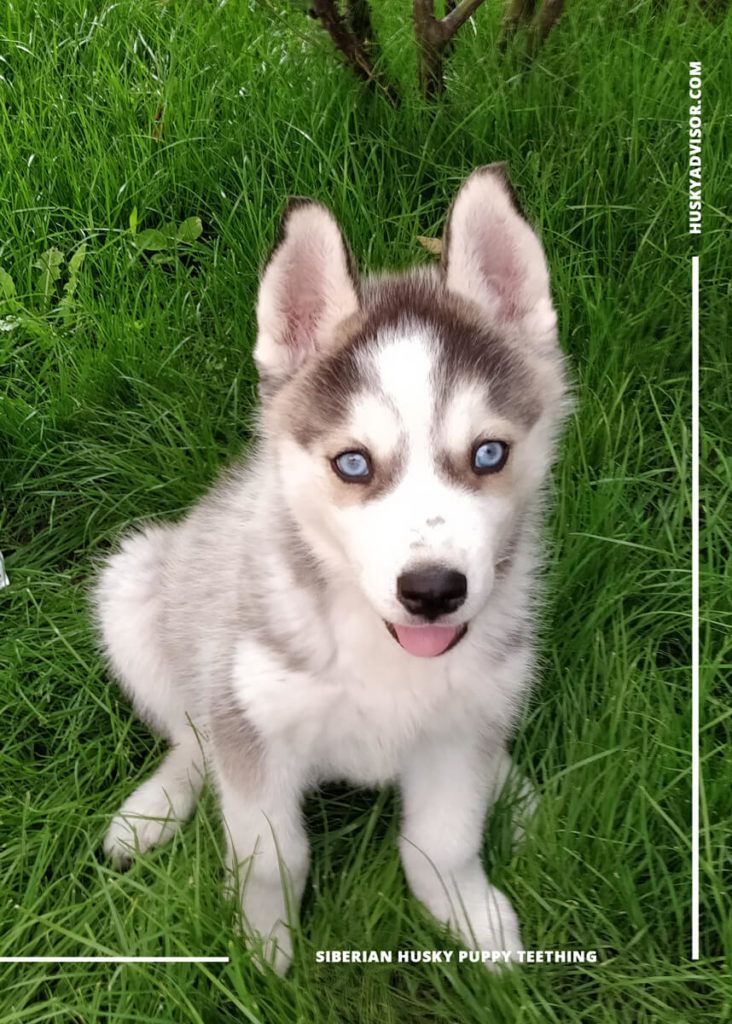
Do you remember the pain that you suffered when your adult teeth came out? It wasn’t pleasant, right? Your puppy teething period happens much faster. By the age of 8 months, your husky puppy will have all his permanent teeth in. Don’t forget to brush his teeth with a toothbrush and a toothpaste that is specially made for dogs. Never brush your dog with your toothpaste because it is not safe for dogs. Usually, the toothpaste made for humans contains xylitol and other ingredients that will harm your dog.
I hope you found this article useful and interesting. And if you are just going through this period, hang in there! Both of you! 🙂
Warm weather is here! Find out if your Siberian husky is drinking enough water.

